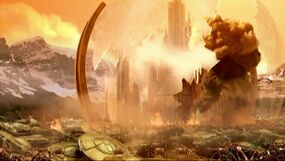The Capitol
The Capitol (also known as the Citadel) was the home of the Time Lords on Gallifrey. (TV: The Deadly Assassin) The Capitol was built on the remains of the original Capitol which was destroyed in the Gallifreyan Civil War. (AUDIO: Lies)
On the continent of Wild Endeavour, in the mountains of Solace and Solitude stood the Capitol of the Time Lords. (TV: The Sound of Drums) It was enclosed in a "mighty glass dome". (TV: Gridlock) It rested on a large, vertical beam, with a wheel-like structure securing it. (TV: The Name of the Doctor, The Day of the Doctor)
The Panopticon was the main room of the Capitol, where the Eye of Harmony was secretly kept far below. (TV: The Deadly Assassin)
The High Council met in the Capitol. There was a transmat system that linked the Council's room to the Death Zone. (TV: The Five Doctors) Also on Gallifrey was the Time Lord Academy. (TV: The Sound of Drums)
The Towers of Canonicity and Likelihood lorded over the northern part of the Capitol. (PROSE: The Blue Angel)
The Vaults were located underneath the Capitol. (AUDIO: Lies) The Vaults contained the ruins of the original Capitol, a graveyard for TARDISes (PROSE: Engines of War) and the Cloisters, which housed the Matrix and Cloister Bells. (TV: Hell Bent) Surrounding the Vaults were ducts and serviceways dating from the Old Time. (TV: The Deadly Assassin) By the time of the Doctor, they were used by those who worshipped shrines dedicated to the cult of "Rassilon the Vampire". (PROSE: Goth Opera)
There was a repair shop in the Capitol; among the items there were TARDISes. Two technicians, Andro and Fabian, were working there when the First Doctor, with his granddaughter, stole a faulty Type 40 TARDIS. (TV: The Name of the Doctor)
The Imperator offered Thessalia the role of chatelaine of the citadel. (PROSE: The Return of the King)
The Capitol was "flooded" by Quarks in an invasion attempt by the Dominators. The invaders were fought by Leela and K9 Mark I, who destroyed 39 between them. Though the invasion was thwarted, one of the Quarks was fitted with a bomb which damaged the Capitol heavily, necessitating the construction of a replacement building. (AUDIO: Time in Office)
By the Last Great Time War, the Capitol had expansive but minimalist spaces with metal walkways, a darkened conference room, and a huge council chamber with Time Lords standing on suspended platforms. By the final day of the War, the Citadel was severely damaged by Dalek Saucers. The crashed saucers remained on the surface next to the Citadel. (TV: The End of Time) Following the Fall of Arcadia, the Capitol became at risk with Dalek forces converging towards it. This danger was detected in the War Room of the Capitol, where the General drew up stratagems with his associates. The Time Vaults contained the Omega Arsenal, where, on the final day of the War, the Moment was stolen from by the War Doctor. (TV: The Day of the Doctor)
After the end of the war, the Capitol was repaired. (TV: Heaven Sent)
Behind the scenes
Though this was not directly contradicted or affirmed by the Graham Williams produced TV story, the novelisation of The Invasion of Time describes the Capitol as covering "most of Gallifrey" and being surrounded by a sheer white wall.
A dome was first associated with Gallifrey in the header art for Doctor Who Magazine's "Gallifrey Guardian" section; this was later shown to be covering the Capitol in DWM comics like The Tides of Time, and Peter McKinstry used it when designing the Capitol for The Sound of Drums. "With the citadel it was an opportunity to take elements of the very organic TARDIS interior and apply them on a much grander scale," he recalled. (ImageFX magazine, October 2008, p. 62) This image of the Capitol as a regular-sized city surrounded by a transparent dome was used in various episodes under showrunners Russell T Davies and Steven Moffat, including a scene in The Name of the Doctor set before the First Doctor left Gallifrey.

